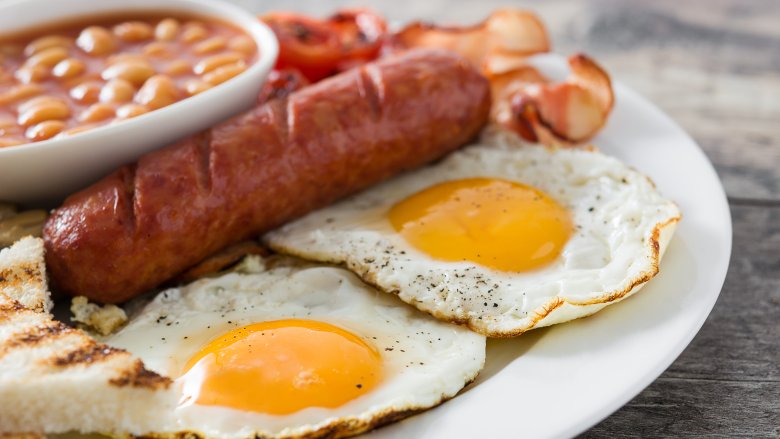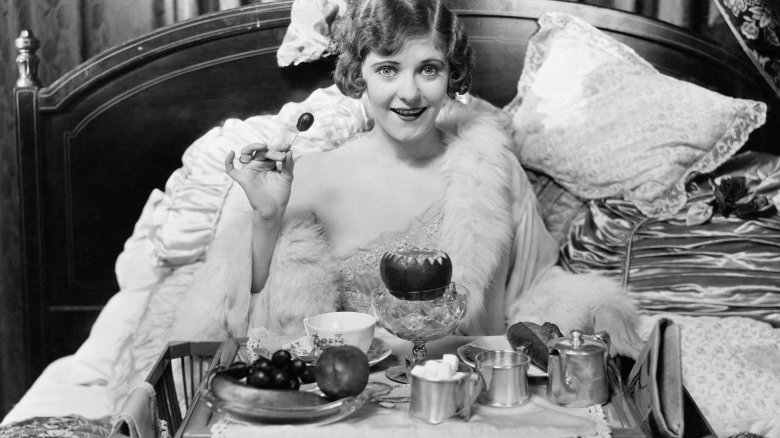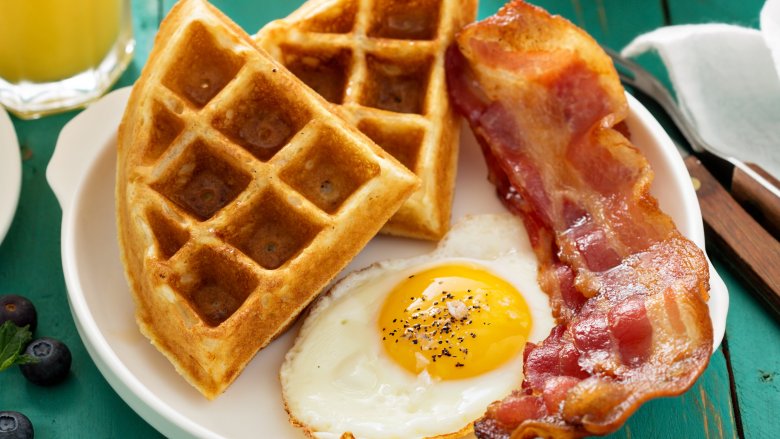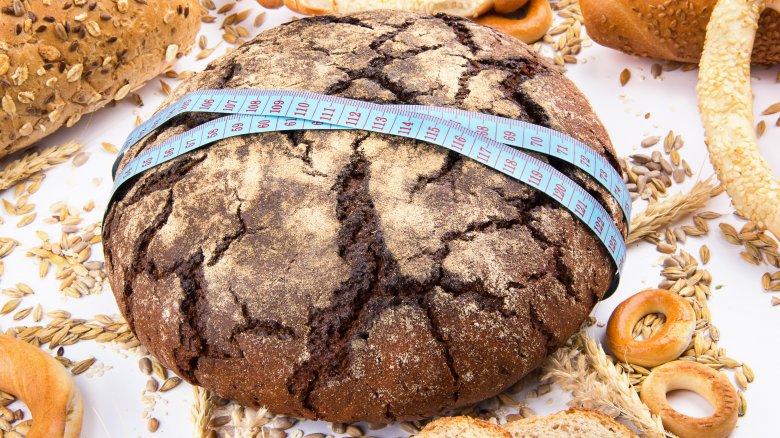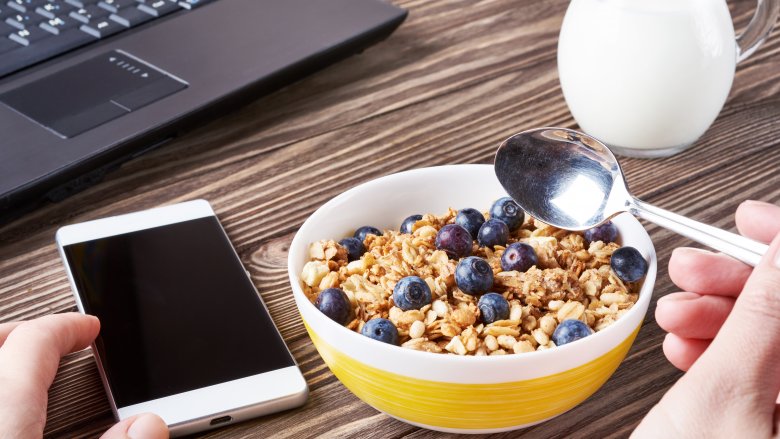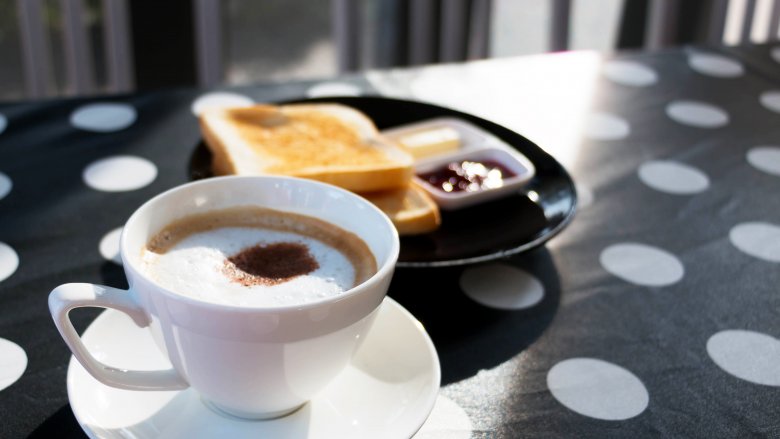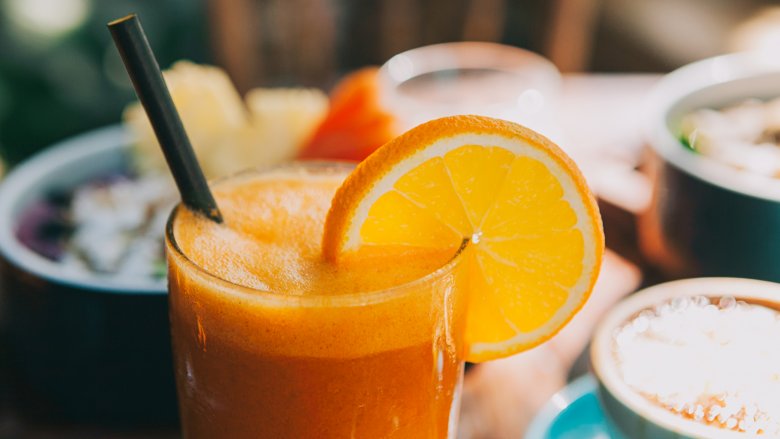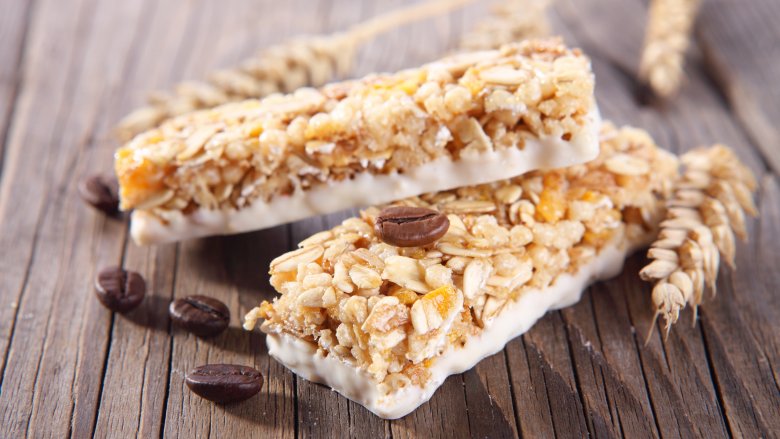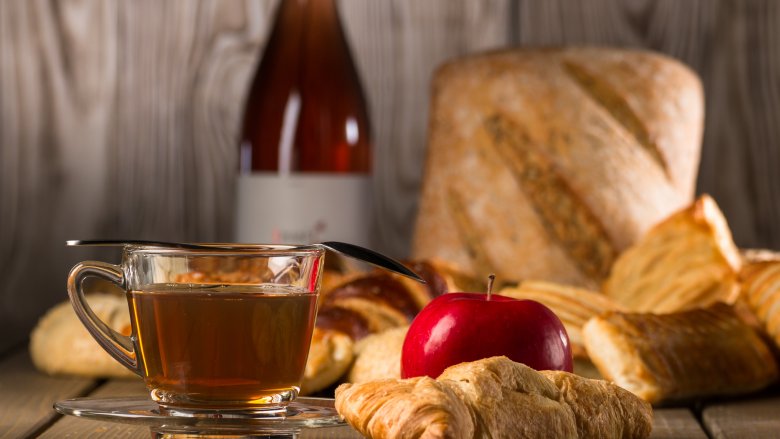False Facts About Breakfast You Always Thought Were True
If you have conflicted feelings about breakfast, you're definitely not alone. You've probably heard things like skipping breakfast will make you gain weight, and you've definitely heard it's the most important meal of the day. But who has time for that every morning? Let's set the record straight about some breakfast myths and misconceptions, and make you feel a tad bit better about your morning routine whether you choose to sit down for breakfast or give it a miss altogether.
We've always started our mornings with a good breakfast
Surely, this so-called "most important meal of the day" has always been getting humankind up and running, right? Not only is that not the case, but some cultures outright condemned the idea of eating in the morning. Ancient Romans believed you should eat once a day, and any more than that was outright unhealthy. By the Middle Ages, religious etiquette dictated that eating in the morning — before Mass — was forbidden.
Our adoption of a breakfast was a slow thing, and starting in around 1412 some upper-class households were slowly permitted to set a formal morning meal. Those formal breakfasts became more common in the 16th century, and for a time it was typically a meal only eaten by the young, the old, the sick, or by laborers who were forced to simply eat when they could. It wasn't until the Industrial Revolution that people were put on a schedule like the ones we see today, and with the necessity of punching a timeclock came another necessity: standardized meal times, because we were no longer setting our own schedules like we had for generations.
Certain foods are "breakfast" foods
Bagels and cereal, pancakes and waffles: they're breakfast foods. We recognize them that way today, but the idea that there are only certain foods we eat at breakfast is a pretty modern one. Go back to 18th-century America, and you might find a breakfast table filled with bread and cheese, or a bit of porridge, and some tea. By the 19th century and into the 20th, the first meal of the day had gotten more complicated, but people just ate whatever they had on hand. That meant breakfast looked the same as dinner, and tables were filled with everything from ham, sausages, and oysters and even cakes and pies.
It's the most important meal of the day
Is breakfast really the most important meal of the day? Conventional wisdom says it'll keep you going all day, but what you might not know is that idea is actually based on a slogan used in a General Foods marketing campaign from 1944. They were selling Grape Nuts, and ad men sold the angle, "Eat a good breakfast — do a better job."
In the middle of the 20th century, vitamins were added to cereals, and marketing campaigns helped paint a picture of breakfast as the most important — and healthiest — meal of the day.
While there have been a ton of scientific studies done to try to figure out just what kind of impact having — or skipping — breakfast has, the idea itself is based in half-truths and marketing strategies.
Skipping breakfast leads to weight gain
Common wisdom says skipping breakfast will do some serious damage to your waistline, but the science is a little fuzzy on the whole thing, and here's why.
Conducting studies on something like this is much more difficult than you might expect. There are a number of problems that come with determining things like what foods count as breakfast, and what time they have to be eaten, which is further complicated by the number of people who don't work traditional hours. There's also a huge amount of cultural differences when it comes to what's typically on the breakfast table. Ghana's waakye is going to be much healthier than an English fry-up, for example, so where do those results fit in?
Looking at the actual scientific studies that have been done about breakfast's impact on weight gives you a confusing set of results that seems to have no consistent pattern whatsoever. Even a 1992 study that completely regulated everything about the quantity of food eaten and when, found it wasn't the food or timing that made a difference, it was a change in normal schedules that helped people lose weight. So for now, this is one myth that's completely busted.
Breakfast makes you smarter
There are a couple different ways you might have heard this one presented, but it's often said there's a direct connection between intelligence and breakfast. Those that eat breakfast are thought to be smarter, and as wonderful as it might be to think that eating breakfast might give you a few extra IQ points, it's unfortunately not true.
In 2015, researchers from Army Medical College and Military Hospital in Pakistan took a cross-section of students, determined whether or not they ate breakfast, and administered an IQ test. The results showed there was no correlation between how a person did on an IQ test and whether or not they ate breakfast.
Even more heartbreaking is the complete debunking of a news story that took the internet by storm in 2016 — that eating ice cream for breakfast was good for boosting brainpower. The study that was quoted over and over again proved incredibly elusive, and needless to say, it was sadly one more example of actual fake news.
Breakfast is the best time for coffee
Even if you don't sit down to a full breakfast, you probably stagger out of bed and straight to the kitchen for your cup of coffee. You're not alone if you swear that it wakes you up and gets you going, but if you look at the way coffee actually works you'll find that breakfast isn't the best time for it — and it might even be hurting its effectiveness.
It has to do with something called cortisol, which is produced by our bodies when it's time to wake up in the morning. When we drink our morning coffee, our bodies recognize the presence of caffeine and, over time, may start to produce less cortisol. That makes it harder to get up in the morning, a vicious cycle you'll probably try to solve with more coffee. Instead of drinking coffee with breakfast, you should be drinking a pre-lunch cup of joe for the biggest boost without the side effects.
A good breakfast always includes juice
Imagine your perfect breakfast, made by someone who has all the time in the world. Did you imagine a tall glass of juice? You probably did, because whether you like orange, apple, or grapefruit, juice is often thought to be one of the staples of a healthy breakfast. Unfortunately, that's not the case.
The first reason juice isn't as healthy as you think has to do with what happens when you turn fruit into juice. Not only do you lose most of the fiber that makes fruit so good for you, you also release the natural sugars. When you eat both fiber and fructose — as you do when you're eating a whole piece of fruit — the fiber keeps a lot of the fructose from being absorbed. Without the fiber, you're getting a major dose of natural sugar that has not only been linked to things like tooth decay and obesity, but is also thought to keep us from feeling full. Studies have shown that while eating whole fruits can lower our risk of things like type-2 diabetes, fruit juice was shown to increase those risks.
Cereal bars are a healthy "quick-fix" breakfast
Take a glance at the cereal bars on the shelves of your local supermarket, and you'll notice that most of them market themselves as being a healthy breakfast alternative. They're made with all sorts of good stuff, after all, and even better, they're convenient. But grabbing one of these bars at random might mean your breakfast is full of more sugar than it would be if you opted for a candy bar instead.
When Action on Sugar took a look at just how much sugar fruit and nut bars tended to have, they examined 20 breakfast bars. Eight of those had three or more teaspoons of sugar. While there are healthy options out there, it's definitely something that requires some research.
There's no place for alcohol at breakfast
Booze for breakfast? Clearly, there's no greater sign of a problem than if you start your day with a glass of wine or a pint of beer... but it turns out there's a long tradition of starting the morning with precisely that.
When President Barack Obama took his pre-G7 summit breakfast with a pint of beer in 2015, it looked odd to American eyes. But it's a hugely popular European tradition that remains to this day, and not just in Germany and Belgium. Even breakfasts in colonial America were often served with a hearty helping of beer, and in Mediterranean countries, a morning coffee is often fortified with brandy or sambuca.
While there was a lull in the idea of serving alcohol for breakfast, there's been a re-emergence of the tradition. Restaurants in London are embracing the idea of breakfast wine, and according to the experts the wines should be dry, lightly chilled, and with a low alcohol content.
You don't have time for breakfast
Mornings are busy for most people, there's no denying that. But that doesn't mean you have to settle for a cereal bar. You do, in fact, have plenty of time for a breakfast everyone will enjoy.
Check out this list of simple breakfast casseroles that are sure to get you going in the morning. From a ham and cheese croissant casserole to cheesy sausage and egg breakfast sliders, there's something for everyone. And if you don't have time for that, how about these slow cooker breakfasts you can prepare the night before, so all you need to do in the morning is plate them up.
And, if you're still looking for some tips and tricks to make preparing breakfast a breeze even before you've had that first cup of coffee, check out these breakfast hacks. Your morning will be so much better for it, and while you might not get smarter, your coworkers won't notice your grumbling stomach as lunchtime approaches, either.
